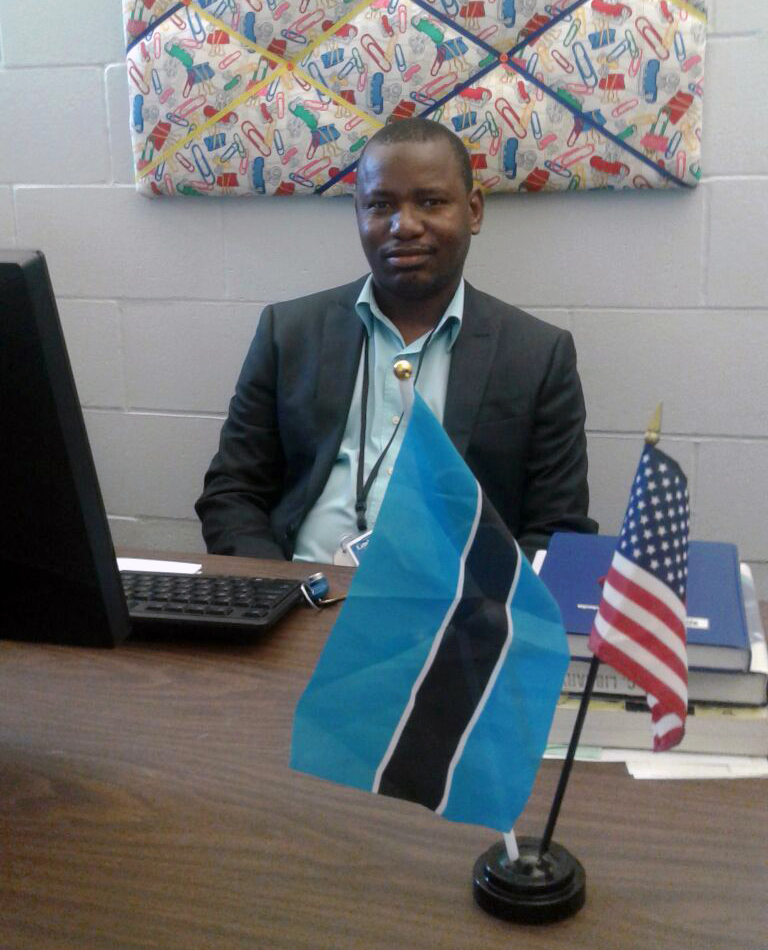The Gravity of Letshwiti Tutwane
Lane Hardy
Judging from his humble smile and friendly, disarming demeanor, one wouldn’t guess the deep complexity of Dr. Letshwiti Tutwane. Far from simple, Dr. Tutwane is a passionate, intelligent man of principle, with a remarkably wide variety of ambitious interests and pursuits, in his own words, “I wear different hats”.
He came ICC as a Fulbright scholar, a prestigious scholarship exchange program which among many other things, provides grants for exceptional professionals from around the world to visit universities in the U.S. While here he will be working in the arts and communication department, giving guest lectures, and teaching two classes during the spring semester. With a bachelor’s in history and English, a master’s in Journalism and Cultural Studies, a master’s in Media Communication Research, and a doctorate in Journalism, he is well qualified to do so.
“I’m an academic who really believes that one should make a contribution to knowledge, so that the university is not seen as an ivory tower where people just fantasize things that aren’t in the real world,” he said.
That, however, is only the tip of the iceberg. As well as being a professor at the University of Botswana, where he teaches Journalism, Communication and Media Law, he is also a businessman, a politician, a community leader, a political consultant, a motivational speaker, a farmer, and a preacher. Dr. Tutwane does indeed wear many hats.
The breadth of the roles he plays has not come about by happenstance. He is deeply motivated by the religious beliefs and moral principles he upholds, by his love for his country and its citizens, and by the many figures of great men who came before him.
Inspired by individuals such as Nelson Mandela and Kwame Nkrumah, Dr. Tutwane has a vision for his home country. In the untapped natural resources of Botswana he sees the potential to address trade deficits, and combat unemployment. Coming from a poor background himself, he isn’t removed from the troubles of those in need.
“I grew up in the community, I’m a child of the community, even though I’m educated, I’m in the university, I can still sympathize with my people and interact with them, and be part of them,” he said.
Dr. Tutwane sees himself as a public intellectual, and believes that it’s the responsibility of the educated to use their education to invest into the community, to make the world a better place. He believes that everyone has the power to change the lives of others in a positive way. Upon his return he may run for parliament, and possibly in the future, president of Botswana. His philosophy is that politics are “the art of the possible,” and shouldn’t be about pomp or making money, but serving people.
He also feels that diversity is important and very beneficial.
“When you’re exposed to other cultures, it takes away your prejudices, helps you to understand people better, it also creates opportunities for you,” he said.
Dr. Tutwane is no stranger to different cultures, as he is a world traveler, having visited many countries.
“I’ve traveled the world, I’ve seen the good and the bad, wherever I go, I try to learn something,” he said.
Despite his thorough education and powerful sense of purpose, Dr Tutwane remains a very warm, down to earth individual. If you visit his office at the right time, you might find him smiling and dancing with the music as he works to the beat of gospel music from his home.
To the students of ICC, he imparts three pieces of wisdom.
“There’s a saying that ignorance is bliss and knowledge is power. It’s very important that you take your privilege of being in a college very seriously, and make the best of it.”
“Education is not only what you learn in the classroom. It’s your everyday interactions with other people, especially from other cultures.”
“It is not where you studied that matters, whether you studied at Harvard, whether you studied at Bradley, whether you studied at ICC, that does not matter. What matters is what do you do with your education.”

